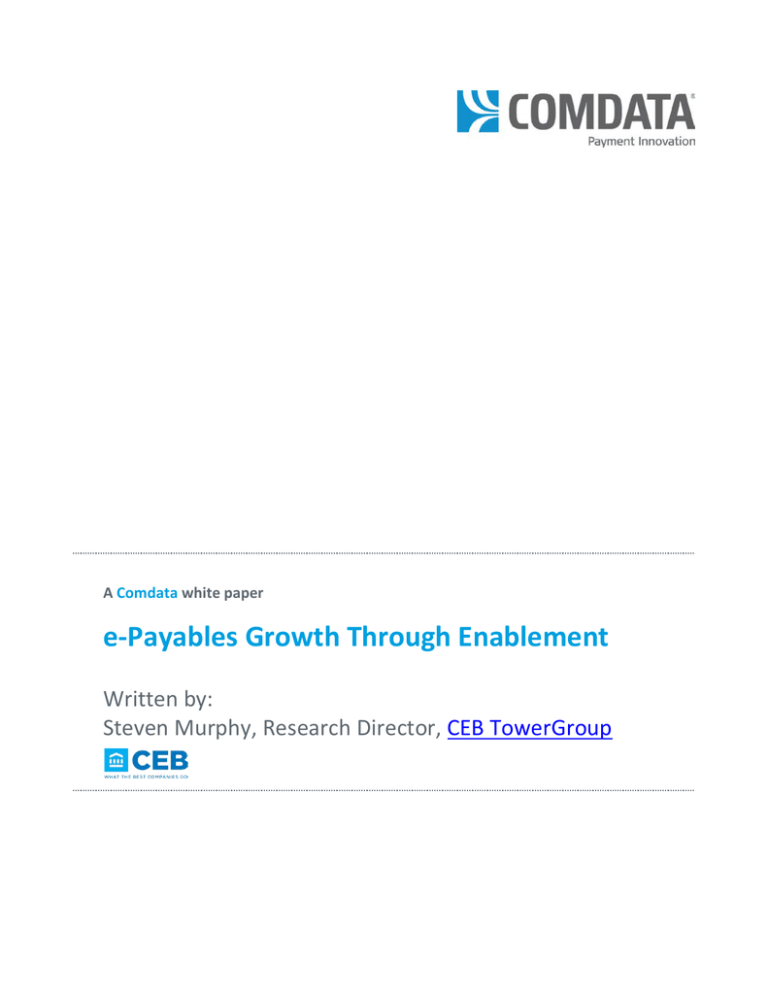
A Comdata white paper
e-Payables Growth Through Enablement
Written by:
Steven Murphy, Research Director, CEB TowerGroup
WHITE PAPER e-Payables Growth Through Enablement
Electronic payments have finally gained the ongoing momentum to allow for
projections of a date when paper will no longer be part of a non-cash payment
discussion. The use of paper checks across North America is projected to
continue a decline at a rate of about 7% annually through 2016.
Correspondingly, all other forms of non-cash payment types (credit card, debit
card, credit/debit transfers) will increase between 3-8% per year during the same
period. Process efficiency has gained the attention of commercial clients, causing
the scope of the role of the Cash Manager/Treasurer to evolve into other core
functions of the institution (risk management, international trade).
The following two figures are taken from the CEB TowerGroup Global Payments
Database. Figure 1 shows that the declining trend lines are clear for checks across
the globe. Figure 2 highlights the North American growth in all forms of
electronic payments.
1.800.COMDATA / comdata.com
© Comdata Corporation. All rights reserved. Printed in USA. Comdata is a trademark of Comdata Network, Inc. and a wholly owned subsidiary of Ceridian Corporation. The Comdata
Card is issued by Regions Bank, pursuant to a license by MasterCard International Incorporated. MasterCard is a registered trademark of MasterCard International Incorporated.
WHITE PAPER e-Payables Growth Through Enablement
Commercial payments can certainly be seen as a global opportunity. The use of
paper continues to play a role but one that is declining, while e-payables
capabilities continue to drive investment in commercial payables automation.
Expenses outpace revenues over the past four years with operating expenses 20%
higher in the first quarter of this year than the same period in 2008.
Although revenues per transaction are decreasing, payment volumes are
expected to increase by 150% between 2010 and 2020. Total payment revenues
will increase in line with volume growth despite the decreasing revenue per
transaction. Process efficiency has gained the attention of commercial clients,
causing the scope of the role of the Cash Manager/Treasurer to evolve into other
core functions of the institution (risk management, international, trade).
1.800.COMDATA / comdata.com
© Comdata Corporation. All rights reserved. Printed in USA. Comdata is a trademark of Comdata Network, Inc. and a wholly owned subsidiary of Ceridian Corporation. The Comdata
Card is issued by Regions Bank, pursuant to a license by MasterCard International Incorporated. MasterCard is a registered trademark of MasterCard International Incorporated.
WHITE PAPER e-Payables Growth Through Enablement
CEB TowerGroup believes that the adoption of one or more electronic product,
process or service along the commercial value chain will have a natural domino
effect, further influencing the increasingly rapid transformation of the epayments ecosystem. One example of this effect is the onboarding of a supplier
into an e-commerce vertical or horizontal network, which expands the electronic
marketplace for buyers and sellers, but also results in the adoption of e-invoicing
by the supplier. A continued domino effect occurs when e-invoicing leads to
automated receivables and three-way data matching for straight-throughprocessing (STP). This enablement can be taken to an even further transformative
degree by virtue of the increasing utilization of messaging standard ISO 20022 for
payments, which allows for a greater integration of financing opportunities within
the global supply chain.
Driven by the growth opportunity in payments and cost management demands,
investment in payables automation systems is expected to increase. Supporting
an integrated payment file, a comingled file containing ACH, wire, check, and/or
card transactions, will be a priority in supporting a modern payables automation
system.
Executives faced with increased regulatory burdens and slowing industry
revenues have shifted focus to expense management. Eighty percent of
executives identify system limitation as the key challenge in remaining compliant.
They struggle with managing regulatory changes and reducing costs within
outdated systems environments categorized by inflexibility and manual
processes. The payment landscape is becoming more competitive with valueadded and complementary services to differentiate providers and vendors.
Corporate clients and financial institutions, alike, are moving toward an enterprise
payment solution, where the individual payment network (and process) is
transparent to the corporate client. We expect that many of the emerging
technologies will be standard offerings in the next 24 months. Firms will leverage
emerging technologies to help meet the changing regulatory environment. Rulebased workflows will remain important to ensure proper execution of controls
and reconciliation of transactions. As electronic payments continue to grow
1.800.COMDATA / comdata.com
© Comdata Corporation. All rights reserved. Printed in USA. Comdata is a trademark of Comdata Network, Inc. and a wholly owned subsidiary of Ceridian Corporation. The Comdata
Card is issued by Regions Bank, pursuant to a license by MasterCard International Incorporated. MasterCard is a registered trademark of MasterCard International Incorporated.
WHITE PAPER e-Payables Growth Through Enablement
within corporate clients, there will be a greater focus on leveraging tools that
allow decisions ‘on-the-go.’
One product that fits nicely into the increasing need to optimize working capital
and more efficiently process payments is commercial cards. Tremendous growth
potential remains for the inherent efficiencies of the open-network, card-based
systems, especially for enabling e-commerce in procurement-related activities.
The increasing incorporation of card-based settlement into accounts payable
through single-use card numbers and proprietary networks has been growing
rapidly during the past several years. CEB TowerGroup has projected overall
spending volume growth for commercial credit cards in North America to be at a
CAGR of 8.3% through 2014.
More importantly, the Purchase Card (P Card) volumes are expected to grow at a
CAGR of 10.6%, driven by even faster growth in A/P file integration and single-use
accounts. There are various studies that highlight the cost savings realized in using
P Cards in the procurement process. The RPMG Purchasing Card Benchmark
Survey of 2010 assigns an end-to-end administrative cost savings of $70.58 per
transaction by switching from traditional procurement to card based. This is
certainly one of the many reasons why buyer initiated payments solutions have
been gaining wider use.
However, an ongoing challenge in this type of automated solution is the ease of
merchant enablement and choice. Gaining more buy-in from suppliers remains a
key to e-commerce and e-payables expansion. The earlier point about the
expansion of the e-payments ecosystem can also be negatively impacted by lack
of supplier adoption.
In a recent study focused on accounts payable in the e-Payables landscape,
Ardent Partners found that 77% of their survey responders cite “getting suppliers
to participate in the initiative” as the single the largest roadblock to migrating
from paper to electronic invoices. RPMG reports that acceptance remains the
number one issue for P Card growth outside of North America. In many cases
suppliers either have not enabled card based payments acceptance or prefer with
1.800.COMDATA / comdata.com
© Comdata Corporation. All rights reserved. Printed in USA. Comdata is a trademark of Comdata Network, Inc. and a wholly owned subsidiary of Ceridian Corporation. The Comdata
Card is issued by Regions Bank, pursuant to a license by MasterCard International Incorporated. MasterCard is a registered trademark of MasterCard International Incorporated.
WHITE PAPER e-Payables Growth Through Enablement
lower inherent fees. Clearly making things easier for suppliers will help to
increase e-payments growth.
Automated payables systems and networks that allow for straight through
payables processing with a broader choice of settlement methods will be more
attractive to suppliers. An example of this type of capability is Comdata’s
ConnectPay. ConnectPay is a full suite of accounts payable solutions, including:
• Electronic payables.
• Disbursement management.
• Electronic invoicing presentment and payment.
For electronic payables, ConnectPay provides a dual-network capability, offering
one-time use MasterCard account numbers, as well as access to the
ComdataDirect network. The key here is creating merchant flexibility by allowing
for additional e-payment choices when cards are not a viable option. The
numerous benefits of automated payables (reduced costs, improved liquidity
management, financial control) are open to all suppliers in the network, also
creating enablement for their expansion of the e-commerce ecosystem. The
following figure depicts how ComdataDirect enables this supplier flexibility.
1.800.COMDATA / comdata.com
© Comdata Corporation. All rights reserved. Printed in USA. Comdata is a trademark of Comdata Network, Inc. and a wholly owned subsidiary of Ceridian Corporation. The Comdata
Card is issued by Regions Bank, pursuant to a license by MasterCard International Incorporated. MasterCard is a registered trademark of MasterCard International Incorporated.
WHITE PAPER e-Payables Growth Through Enablement
Commercial clients are demanding products and services that integrate into their
Enterprise Resource Planning (ERP) system. The interconnected nature of ecommerce requires flexible and innovative approaches so that the greatest
number of buyers and suppliers can participate. CEB TowerGroup views network
solutions such as ComdataDirect as an enabler for faster growth in the e-Payables
space.
1.800.COMDATA / comdata.com
© Comdata Corporation. All rights reserved. Printed in USA. Comdata is a trademark of Comdata Network, Inc. and a wholly owned subsidiary of Ceridian Corporation. The Comdata
Card is issued by Regions Bank, pursuant to a license by MasterCard International Incorporated. MasterCard is a registered trademark of MasterCard International Incorporated.


